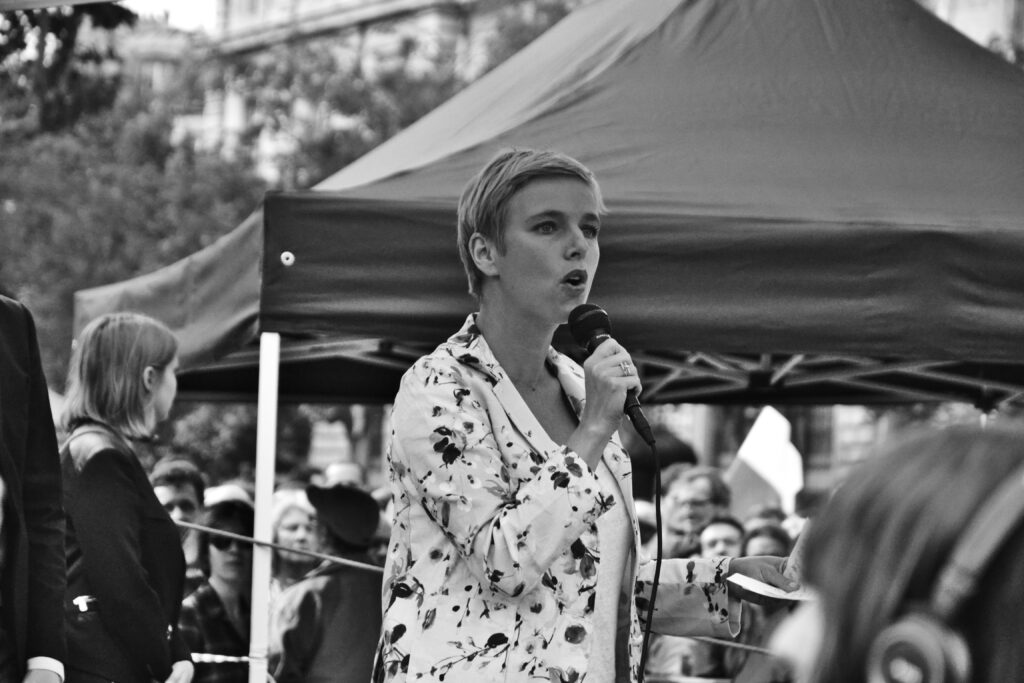The Regionals 2021, first round: An Overview

The first tour (round) of the 2021 regional and departmental elections in France is now over.
It surprised everyone.
The elections held throughout the country on June 20 seem to have muddied, rather than clarified, the forecasts for the presidential elections next year.
And they are not over. The finalists of the first round will go against each other on Sunday, June 27.
The Régions and departmental cantons were redrawn in 2015, under President François Hollande; the departmental elections of that year were held in March, and the regionals were held in December. (Because of the pandemic, these next elections for both departments and regionals were moved to June.)
Departmental elections are voted canton by canton within the departments; and each ticket runs a binôme, or male/female pair, to promote equality of representation. The winning binômes for each canton are both elected to the departmental council, but each may then go their own separate ways.
In regional elections, the head of each regional list is selected (in an investiture) by the party or an alliance of parties. He or she then selects those on the regional list, alternating between male and female (the higher the rank on the list, the more likely the chance to sit on the council). These regional lists are running for election to the regional councils; they are divided according to departments (i.e., only those in the same department may vote for their departmental section of the list, not the entire list.) The winning list automatically gets 25% of the seats; the rest of the seats are distributed proportionally among those who contest the second round, including the winning list. The regional lists are chosen among local “civilians” or officeholders; thus a regional list may include local mayors or departmental council members, for example. Though the Regional departmental sections may overlap in terms of personnel, the regional lists are separate from the departmental lists–something that is harder to understand when both sets of elections are held on the same days, as they are this year.
The main points to take away from the results (focusing mainly on the outcome of the regionals):
PARTICIPATION: Disturbingly low.
- There was a very high rate of abstention, averaging about 66%. The highest rate of participation was in Corsica, at 57% (only 43% abstention).
- The participation rate was lowest among young people (18-24 years old), at a dismal 13%, with even those of 35-49 years old only rising to 17%. (1)
- All of the regions in France will have a second round, next Sunday (June 27) because no party or electoral alliance achieved a majority of the votes.
THE BIGGEST LOSERS:
- Marine Le Pen’s party, the Rassemblement National. Their supporters were expected to turn out in great numbers, and especially the young, to support the RN candidates, creating a wave that would carry Le Pen into the presidency in 2022. They actually did relatively well throughout the country, but fell victim to their own high expectations, which they magnified instead of tamping down; indeed, the leadership had publicly indicated that this was a trial run for the presidentials. While they remained strongest in the South, their traditional stronghold (see Riviera Regionals, this blog), they also had creditable showings throughout the country. But their hopes for taking a region now rest largely in Paca (Provence-Alpes-Côte d’Azur), and they face obstacles there.
- Emmanuel Macron’s party, La République en Marche. The expectations for this party were low, and they fulfilled them. At best, they had hoped to be “kingmakers” in the second round by winning at least 10% of the vote (the floor for running in the second round, or for deal-making. In 6 of the 13 regions of Metropolitan France of the regions, they fell short of even that modest goal. After the municipal elections of 2020, in which LREM did not win the mayoralties of any of the major or even middling cities, it is clear that LREM has no deep-rooted strength in the countryside. It is a new party, built around Macron, who also carried a stunning majority of new-minted LREM candidates into the National Assembly with him. What now?
- The polls. They grossly over-predicted Marine Le Pen’s party and under-predicted Les Républicains. The apparent answer for this? Or at least the answer that the RNs preferred: the old people attached to the old parties (including the Socialists) voted, the RN’s young people did not. Another answer: the educated and comfortable tend to vote; while the voters that the RN has cultivated, in the popular and precarious classes, are less reliable.
THE BIGGEST WINNERS:
- Les Républicains (LR). Under the leadership of Christian Jacob, they took a hard line against any alliances with LREM or with the RN, a highwire act that seems to have paid off–though the greatest test of that strategy will be in Paca, a rather more complicated situation. They ran as LRs or under the DVD line (diverse droite, in alliance with smaller conservative parties) but maintained a clear identity–even in Hauts-de-France (see earlier post, this blog), where the leading candidate, Xavier Bertrand, is no longer a member of the party but whose political history and ideology leave him firmly in the LR camp; and the LRs wisely chose to back him, rather than running a different candidate. After being excluded from the 2017 presidential second round, and their disastrous showing in the European Parliament elections in 2019 (see earlier post, this blog) they are positioned for a comeback as the leading opposition party. While there are some divisions within, they have maintained their “center-right” identity relatively intact–indeed, some of the far right members of the party have already joined the RN.
- Incumbent council presidents in general, many of whom are LR. With the exception of Paca, where the incumbent president of the Regional Council, Renaud Muselier (LR) came in second to Thierry Mariani (formerly of Les Républicains, now representing Le Pen’s National Rally)–with that notable exception, all the incumbents came in first in their respective races and in at least two cases seem poised to win. (2)
MIDDLING SUCCESS (i.e., rather more than survival, and better than they hoped):
- The Left, in electoral alliances, led by either the Socialists (PS) or the Ecology-Green party (EELV), and often with the participation of the French Communist Party (PCF). This is a far more modest victory than the one scored by the LRs, in part because of a number of small splinter groups, but mainly because of La France Insoumise (LFI), the “left of the left,” the party founded by the former Socialist Jean-Luc Mélenchon. The LFI controls a sizable portion of the far-left-but-not-actually-communist wing, and the prickly, controversial Mélenchon has declared that he will run for president. Perhaps more significantly, the LFI will clearly be the target of both the National Rally and the Republicans, who have already demonized this party as pro-immigrant and pro-Muslim; the Republicans have been experimenting with the conceit that the LFI is the left-wing equivalent of the RN–extremist, fringe, dangerous. This rhetorical strategy will create a dilemma for the rest of the Left, who will be forced to exclude them, or to defend them.
The RN candidates, riding high in the polls before the election, were gobsmacked by the low turnout, and berated their supporters who had deserted them at the time of voting: “I ask you to move!” (Chénu, Hauts-de France); “Wake up!” (Odoul, Bourgogne-Franche-Comté); “If you don’t vote [next] Sunday, nothing will change in our region, nothing will change in your lives!” (Mariani, PACA).(3)
Some, including Marine Le Pen, issued a renewed call to go vote on Sunday, June 27, to wrest victory out of the jaws of defeat: “We’re talking about this election as if it’s over, but it isn’t over. . . . Our voters can turn out massively in the second round and totally change the results.”
Jordan Bardella, who led the RN list in Ile-de-France (the Paris region) was more pragmatic, and showed why he, at only 25, is one of the elite circle of party leaders around Marine Le Pen. The first round of voting gave the lead with about 36% to incumbent Ile-de-France president Valérie Pécresse (a national figure, formerly a minister, who has since dropped out of Les Républicains and founded her own party, Libres). Coming in second was Bardella, who led the RN list to only 13% of the vote. The Left candidates–Audrey Pulvar, Socialist Party, with 11% of the vote, and Clémentine Autain, La France Insoumise, with 10% of the vote–immediately united behind EELV candidate Julien Bayou, who took 12.97% of the vote. The presidential majority (LREM) candidate at 11.79%, Laurent Saint-Martin, is remaining in the contest, for a quadrangulaire. (4)

In the between-rounds debate, while other RN candidates were repetitively delivering soundbites imploring their voters to turn out, Bardella took a different tack: “Valérie Pécresse will be elected president of the Region, everybody knows it.” He went on to suggest that a strong turnout on Sunday would strengthen the RN opposition to the support, by the Left and by Pécresse, of the migrants and the undocumented. In a very brief answer, he managed to convey the essential sameness of the “old” Left and Right, and the mission of the RN to stand up for France and its people.
The next round of elections will be held on Sunday, June 27; they will have the results later on Sunday.
============================================================
(1) *Nicolas Berrod, “Abstention record aux régionales: qui en a vraiment profité?” Le Parisien, June 21, 2021. https://www.leparisien.fr/elections/regionales/abstention-record-aux-regionales-qui-en-a-vraiment-profite-21-06-2021-KRN5EIGEPRHS7NY2MZAGTZZ6WU.php?xtor=EREC-109&utm_medium=email&utm_source=internal&utm_campaign=newsletter_politique
(2) Ibid.
(3) As collected by Nabil Touati, “Régionales 2021: quand le RN sermonne ses électeurs déserteurs,” Le Huffpost, June 21, 2021. https://www.huffingtonpost.fr/entry/regionales-2021-quand-le-rn-engueule-ses-electeurs-deserteurs_fr_60cfa77fe4b0dd017428b06c?utm_source=Sailthru&utm_medium=email&utm_campaign=NL%2006%2021%202021&utm_term=fr-daily-brief
(4) (4) “Île-de-France: résultats des élections 2021,” Le Monde, June 21, 2021. https://www.lemonde.fr/resultats-elections/ile-de-france/